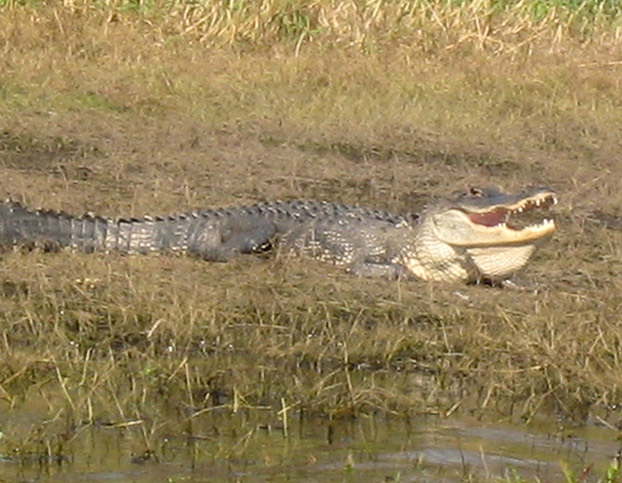Savannah, with its Spanish moss-draped oaks and beautiful waterways, offers a perfect setting for pet owners. We love taking our furry friends for strolls through historic squares or along the marsh. But amidst this picturesque beauty lies a unique wildlife danger: the American alligator.
Alligators pose a threat to pets due to their natural prey drive, stealth, and incredible power. As veterinarians, we want to ensure every Savannah pet owner is equipped with the knowledge to keep their beloved companions safe. This guide will help you understand where alligators lurk, how to prevent dangerous encounters, and what to do if the unthinkable happens.
How Common Are Alligator Attacks: What the Statistics Say
The good news is that alligator attacks in Georgia are statistically rare, especially fatal ones. According to the Georgia Department of Natural Resources (GA DNR), from 1980 to July 2023, there were only nine reported cases of alligator attacks on humans in Georgia, including one fatality in 2007. Most of these incidents involved humans stepping on or otherwise making contact with a submerged alligator, or the alligator mistaking a human for prey.
While specific data on alligator attacks on pets is not readily available from state wildlife agencies, the danger is well-recognized. Florida, with its vast alligator population (estimated at 1.3 million), provides some insight. While they track human attacks (over 450 bites since 1948, with 30 fatalities), their records often categorize alligators that “attack domestic animals” as nuisance alligators, leading to their removal.
Some of the human attacks in Florida and South Carolina have occurred when a person was with their dog, and in some instances, it’s believed the alligator initially targeted the pet. A fatal attack in Florida in February 2023 involved a woman trying to save her dog from an alligator. Similarly, a South Carolina fatality in July 2023 involved a woman walking her dogs. These incidents highlight that pets can unfortunately be perceived as prey, increasing the risk, especially when they are close to the water.
While rare in Savannah, Alligator attacks on dogs can occur. In 2017, we treated a canine patient at Savannah Veterinary Internal Medicine that had severe live-threatening injuries after being grabbed and submerged by an alligator while picnicking out on one of the coastal barrier islands after a day of boating.
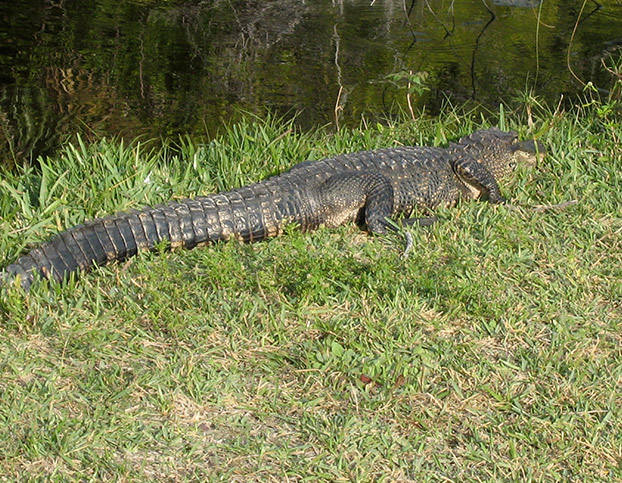
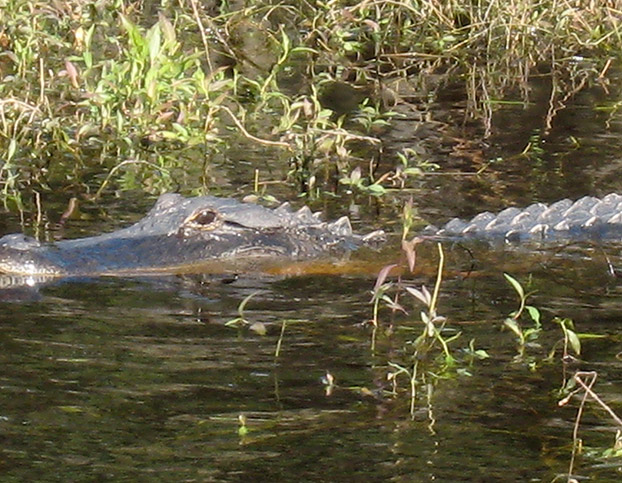
Where Alligators Are Found (and Where to Be Extra Vigilant with Your Pet)
Alligators are a natural and vital part of the Coastal Georgia ecosystem. They thrive in:
- Freshwater and Brackish Water: This includes ponds, lakes, rivers, canals, and ditches. Even the retention ponds in many residential developments are potential alligator habitats.
- Wetlands, Marshes, and Swamps: Areas like those bordering the Ogeechee River, or the vast coastal marshes, are prime alligator territory.
- Unexpected Locations: Don’t be fooled by appearances! Golf course ponds, backyard ponds connected to larger systems, and even stormwater drains or ditches after heavy rains can harbor alligators. For those living in communities like Skidaway Island, Southbridge, and The Landings, where water features are integral to the landscape, vigilance is paramount. Even Tybee Island’s backwater areas can have gators.
Alligators are most active during the warmer months (spring, summer, early fall) and during dusk and dawn, which are their prime hunting times.
Preventing Alligator Encounters: Essential Safety Tips
Prevention is always the best defense. By following these essential tips, you can significantly reduce the risk of an alligator encounter:
- Leash Your Pet (Always!): This cannot be stressed enough. Never allow your pet off-leash near any body of water, no matter how small or seemingly safe. Savannah and Chatham County have strict leash laws, especially near natural areas, for good reason.
- Maintain Distance from Water: Keep your pets well away from pond edges, riverbanks, and marshy areas. Alligators are incredibly camouflaged and can be hiding just beneath the surface, even in shallow water.
- Avoid Feeding Wildlife: Feeding ducks, fish, or other wildlife can inadvertently attract alligators, causing them to associate humans and pets with an easy food source.
- Supervise Closely: Never let your pet drink from or play in natural water sources. Be especially watchful during dawn and dusk, when alligators are most active.
- Be Aware of Your Surroundings: Look for official “Beware of Alligators” signs, which are often posted in known habitats. Also, keep an eye out for tell-tale signs like slide marks on banks or unusual ripples in the water. If you spot an alligator, give it a very wide berth.
- Secure Your Yard (If Near Water): If your property borders a pond, marsh, or canal, consider secure fencing that prevents your pet from accessing the water.
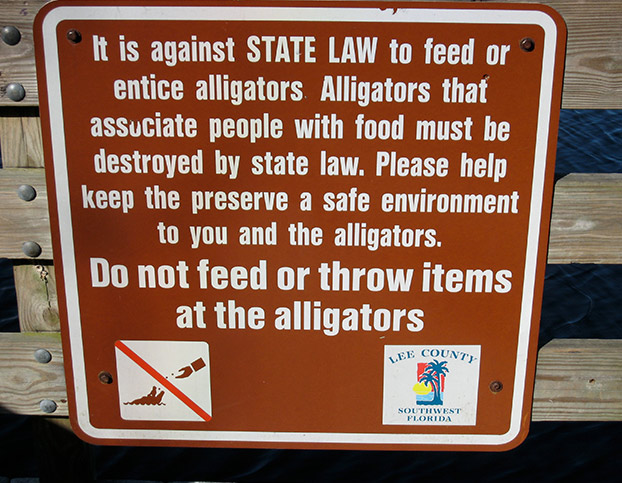
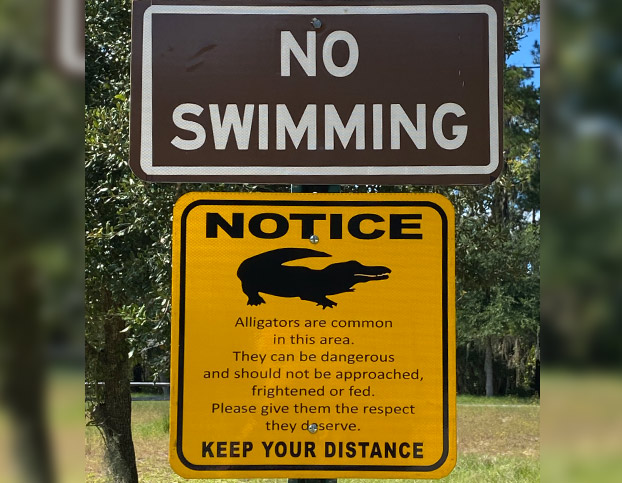
What to Do If You See an Alligator (or Suspect One is Nearby)
Seeing an alligator can be startling, but knowing how to react calmly and safely is crucial:
- Do NOT Approach: Never attempt to interact with, feed, or harass an alligator. Maintain a safe distance of at least 60 feet (18 meters).
- Keep Your Pet Calm and Leashed: Gently pull your pet away from the area. Do not run, as this might trigger a chase response from the alligator.
- Report Aggressive or Problem Alligators: While most alligators are shy and avoid humans, some can become “nuisance alligators” if they approach people, pets, or boats, or bask in unexpected places where they pose a threat. If you encounter an alligator exhibiting aggressive behavior, or if it’s in a location where it poses a clear danger to the public or pets, contact the Georgia Department of Natural Resources (GA DNR) Wildlife Resources Division. They have a nuisance alligator program to handle such situations. You can reach the GA DNR at 1-800-241-4113.
What to Do in Case of an Alligator Attack (Emergency Protocol)
An alligator attack on a pet is a terrifying scenario, but immediate action can make a difference:
- Immediate Action: It may be your initial reaction to fight back — it’s understandable: emotions and adrenaline are high! As understanding as this reaction is, many professionals do not recommend this, especially for sizable alligators. As highlighted above, this may not save your dog’s life, and may only put your life in jeopardy.
- Seek Immediate Veterinary Care: Even if injuries appear minor, alligator bites can cause deep puncture wounds that are highly prone to severe infection. Immediately transport your pet to your veterinarian or the nearest emergency veterinary clinic without delay. It’s helpful to call ahead in transit to give the facility and the veterinary team the heads up what is happening.
- Report the Incident: Contact the GA DNR after ensuring your pet’s safety and medical attention.
Conclusion: Enjoy Savannah Responsibly
While alligators are a part of Savannah’s unique ecosystem, and statistically, attacks on both humans and pets are rare, vigilance is your best defense. By staying informed, adhering to leash laws, and practicing responsible pet ownership, you can significantly reduce risks.
We encourage you to enjoy the beautiful natural environment Savannah offers with your beloved pet. Share your own outdoor pet photos on our Google Business Page and contact us if you have questions about your furry family member’s health.

Author:
James Woods DVM, MS, DACVIM (SAIM)
Ph: (912) 721-6410
Contact Us
